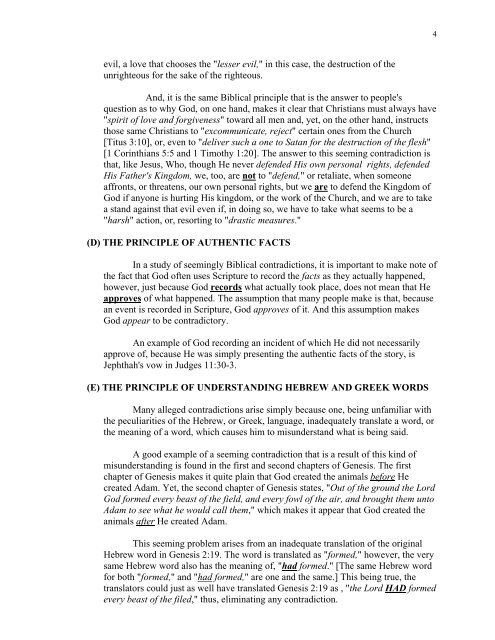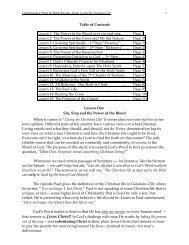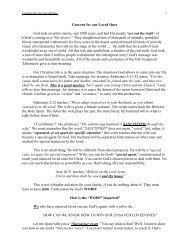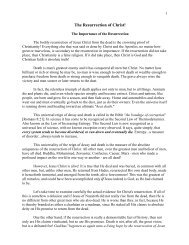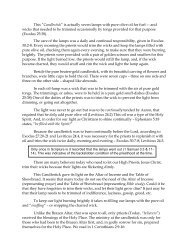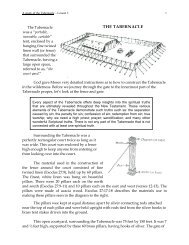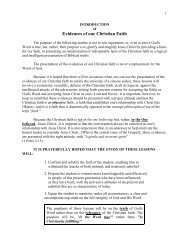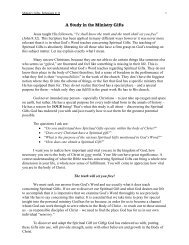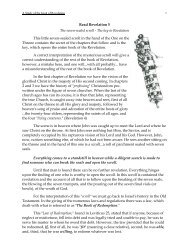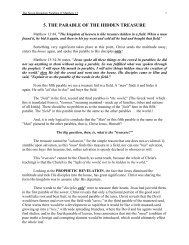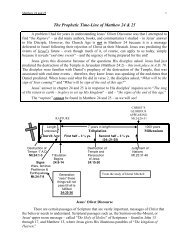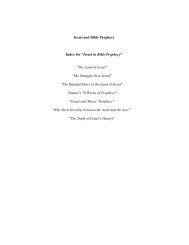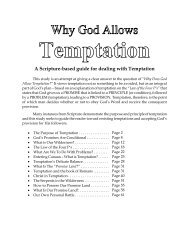ALLEGED BIBLE CONTRADICTIONS - NetBibleStudy.com
ALLEGED BIBLE CONTRADICTIONS - NetBibleStudy.com
ALLEGED BIBLE CONTRADICTIONS - NetBibleStudy.com
Create successful ePaper yourself
Turn your PDF publications into a flip-book with our unique Google optimized e-Paper software.
4<br />
evil, a love that chooses the "lesser evil," in this case, the destruction of the<br />
unrighteous for the sake of the righteous.<br />
And, it is the same Biblical principle that is the answer to people's<br />
question as to why God, on one hand, makes it clear that Christians must always have<br />
"spirit of love and forgiveness" toward all men and, yet, on the other hand, instructs<br />
those same Christians to "ex<strong>com</strong>municate, reject" certain ones from the Church<br />
[Titus 3:10], or, even to "deliver such a one to Satan for the destruction of the flesh"<br />
[1 Corinthians 5:5 and 1 Timothy 1:20]. The answer to this seeming contradiction is<br />
that, like Jesus, Who, though He never defended His own personal rights, defended<br />
His Father's Kingdom, we, too, are not to "defend," or retaliate, when someone<br />
affronts, or threatens, our own personal rights, but we are to defend the Kingdom of<br />
God if anyone is hurting His kingdom, or the work of the Church, and we are to take<br />
a stand against that evil even if, in doing so, we have to take what seems to be a<br />
"harsh" action, or, resorting to "drastic measures."<br />
(D) THE PRINCIPLE OF AUTHENTIC FACTS<br />
In a study of seemingly Biblical contradictions, it is important to make note of<br />
the fact that God often uses Scripture to record the facts as they actually happened,<br />
however, just because God records what actually took place, does not mean that He<br />
approves of what happened. The assumption that many people make is that, because<br />
an event is recorded in Scripture, God approves of it. And this assumption makes<br />
God appear to be contradictory.<br />
An example of God recording an incident of which He did not necessarily<br />
approve of, because He was simply presenting the authentic facts of the story, is<br />
Jephthah's vow in Judges 11:30-3.<br />
(E) THE PRINCIPLE OF UNDERSTANDING HEBREW AND GREEK WORDS<br />
Many alleged contradictions arise simply because one, being unfamiliar with<br />
the peculiarities of the Hebrew, or Greek, language, inadequately translate a word, or<br />
the meaning of a word, which causes him to misunderstand what is being said.<br />
A good example of a seeming contradiction that is a result of this kind of<br />
misunderstanding is found in the first and second chapters of Genesis. The first<br />
chapter of Genesis makes it quite plain that God created the animals before He<br />
created Adam. Yet, the second chapter of Genesis states, "Out of the ground the Lord<br />
God formed every beast of the field, and every fowl of the air, and brought them unto<br />
Adam to see what he would call them," which makes it appear that God created the<br />
animals after He created Adam.<br />
This seeming problem arises from an inadequate translation of the original<br />
Hebrew word in Genesis 2:19. The word is translated as "formed," however, the very<br />
same Hebrew word also has the meaning of, "had formed." [The same Hebrew word<br />
for both "formed," and "had formed," are one and the same.] This being true, the<br />
translators could just as well have translated Genesis 2:19 as , "the Lord HAD formed<br />
every beast of the filed," thus, eliminating any contradiction.


